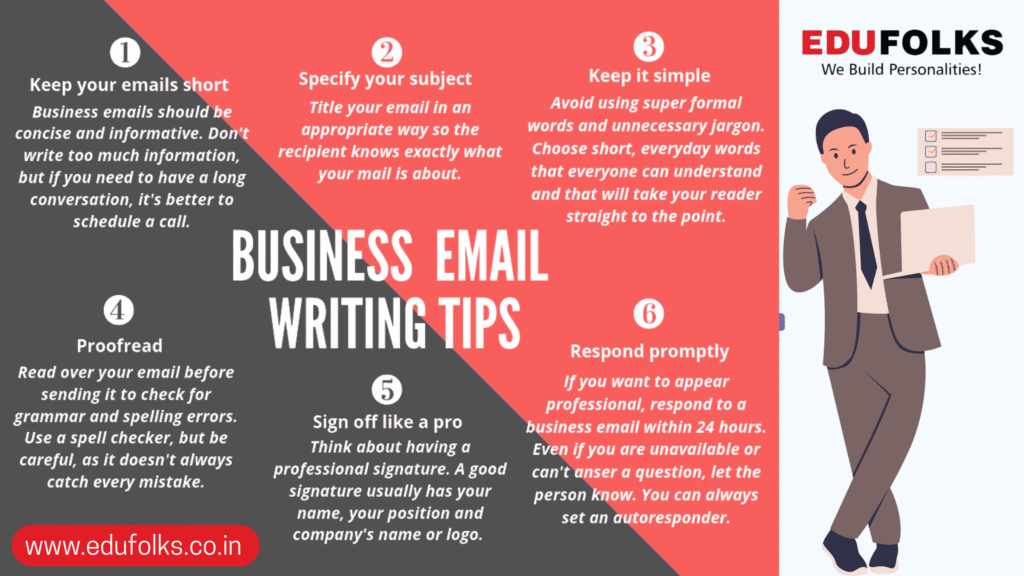In today’s fast-paced corporate world, emails remain one of the most common and essential forms of communication. Writing a professional business email is crucial—not only to convey your message clearly but also to establish your credibility and build lasting relationships. Whether you’re communicating with colleagues, clients, or partners, sounding professional matters. Below are some practical tips and suggestions to elevate your email writing skills, avoid common pitfalls, and leave a positive impression.
By following these guidelines, you can learn how to Sound More Professional in Business Emails.
1. Start with a Clear Subject Line
Your subject line should be concise, informative, and relevant. It sets the tone for your email and helps the recipient prioritize reading it. Avoid vague subjects like “Hello” or “Question” and instead use specifics like “Meeting Request for Thursday” or “Proposal Feedback Needed.”
2. Use a Professional Greeting
Begin your email with a respectful greeting such as “Dear [Name],” or “Hello [Name],” depending on your relationship. Avoid overly casual greetings like “Hey” or skipping a greeting altogether, which can come across as abrupt or unprofessional.
3. Keep Your Tone Polite and Courteous
A professional email always maintains a polite tone even when addressing issues or disagreements. Phrases like “Please kindly,” “I would appreciate,” and “Thank you for your time” help make your emails more respectful and less commanding.
4. Be Concise but Complete
Busy professionals appreciate emails that get to the point quickly without omitting important details. Organize your content logically and use short paragraphs or bullet points to make it easier to read. Avoid overloading your email with unnecessary information or going off-topic.
5. Avoid Common Mistakes
Errors in grammar, spelling, or punctuation can make you seem careless. Here are some common mistakes to watch out for:
- Confusing “your” and “you’re”
- Using informal abbreviations like “u” or “pls”
- Overusing exclamation marks or emojis
- Writing long, run-on sentences
Proofread your email before sending it. Reading it aloud can help catch awkward phrasing or typos.
6. Use Formal Language, but Don’t Be Robotic
While it’s important to sound professional, avoid overly complex vocabulary or rigid sentence structures that can make your email hard to understand or impersonal. Strike a balance by using clear, straightforward language. For example, say “I’m following up on our last meeting” instead of “Pursuant to our recent congregation.”
7. Be Mindful of Email Length
Emails that are too brief might seem rude or incomplete, while overly long emails risk losing the reader’s attention. Aim for a well-balanced length—detailed enough to communicate your message but concise enough to respect the recipient’s time.
8. Include a Clear Call to Action
Make sure your email ends with a clear next step or request—whether you want a reply, confirmation, a meeting, or feedback. This directs the recipient on what’s expected and helps avoid back-and-forth emails.
9. Use a Polite Closing
End your emails with a courteous closing phrase such as “Best regards,” “Sincerely,” or “Thank you.” Follow it with your full name and professional signature including your position, company, and contact details.
10. Respond Timely and Appropriately
Professionalism extends beyond writing your email to how you respond. Answer emails within a reasonable timeframe—generally within 24 hours—and match the tone and formality of the sender when replying.
Additional Good Suggestions to Enhance Your Business Emails
- Personalize When Possible: Add a friendly touch by using the recipient’s name and referring to previous conversations or shared goals.
- Use Professional Fonts and Formatting: Stick to standard fonts such as Arial, Calibri, or Times New Roman with a font size between 10 and 12 points. Avoid crazy colors or excessive formatting.
- Avoid Caps Lock: Writing in all caps can be perceived as shouting.
- Limit Use of Jargon: Only use industry-specific terms if you’re sure the recipient understands them.
- Double-Check Attachments: Make sure to attach files when you mention them and label the attachments correctly.
Common Mistakes to Avoid in Business Emails (with Examples)
- Mistake: Informal Language
- Wrong: “Hey, just wanted 2 ask if u can send the report?”
- Right: “Hello, could you please send me the report at your earliest convenience?”
- Mistake: Lack of Subject Line or Vague Subject
- Wrong Subject: “Important”
- Right Subject: “Project Timeline Update – April 2024”
- Mistake: Not Proofreading
- Wrong: “I look foward to you’re reply.”
- Right: “I look forward to your reply.”
- Mistake: No Call to Action
- Wrong: “Please see attached.”
- Right: “Please review the attached document and let me know if you have any questions.”
- Mistake: Being Too Wordy or Unstructured
- Wrong: “I was just thinking maybe if you have time sometime next week we could possibly meet to discuss the new proposal that has been in the works.”
- Right: “Could we schedule a meeting next week to discuss the new proposal?”
- By avoiding these common errors, your emails will be clearer, more effective, and you’ll present yourself as a competent professional.
Final Thoughts
Mastering professional email communication is a valuable skill that pays dividends in business settings. With clear subject lines, polite expressions, concise content, proper grammar, and a respectful tone, you will significantly improve how others perceive you through email. Remember, the goal is effective communication—making it easy for recipients to understand your message and respond accordingly.
Practice regularly, be mindful of the common mistakes, and gradually you will sound more polished and confident in all your business correspondence. After all, sounding professional through email helps build trust, facilitates smoother transactions, and opens doors to exciting opportunities. If you start applying these suggestions today, your business emails will confidently reflect your professionalism and dedication. Happy emailing!

